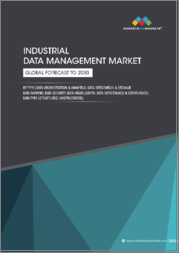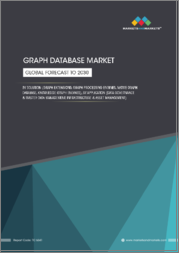
|
시장보고서
상품코드
1472169
데이터 거버넌스 시장 : 규모 조사, 예측, 컴포넌트별, 용도별, 전개별, 업계별, 지역별 분석(2023-2030년)Global Data Governance Market Size study & Forecast, by Component, by Application, by Deployment, by Vertical and Regional Analysis, 2023-2030 |
||||||
세계 데이터 거버넌스 시장은 2022년에 약 27억 5,000만 달러로 평가되었고, 2023년부터 예측(-2030년) 기간 동안 21.70% 이상의 견실한 성장률로 성장할 것으로 예측됩니다.
데이터 거버넌스는 데이터가 조직 내의 전략적 자산으로 관리되는 것을 보장하는 일련의 프로세스, 정책, 기준, 메트릭입니다. 데이터 수집, 저장, 처리 및 사용 방법을 정의하고 품질, 보안 및 가용성을 보장합니다. 데이터 거버넌스의 목적은 데이터와 관련된 의사결정과 행동에 대한 명확한 책임을 확립하는 것이며, 조직이 데이터를 규제 요건에 맞추어 비즈니스 목표를 지원할 수 있도록 하는 것입니다.
엔터프라이즈 시스템에서 데이터 거버넌스는 데이터의 보안, 무결성, 접근성 및 유용성을 모니터링하는 것이며 데이터 사용 방법을 규정하는 내부 데이터 표준 및 정책을 준수하는 것입니다. 효과적인 데이터 거버넌스는 데이터의 일관성과 신뢰성을 보장하면서 부적절한 사용을 방지합니다. 기업이 변화하는 데이터 프라이버시 규정을 다루고 업무를 최적화하고 전략적 선택을 이끄는 데이터 분석에 대한 의존도가 높아짐에 따라 중요성이 커지고 있습니다. 이니셔티브의 감독 기관 역할을 하는 운영위원회, 거버넌스 팀, 데이터 스튜어드의 소속은 일반적으로 철저한 데이터 거버넌스 프로그램에 포함됩니다. exploring topics가 제공한 숫자에 따르면, 2025년까지 아마 181 제타바이트의 데이터가 생성될 수 있으며, 매일 3억 2,877만 테라바이트의 데이터가 생성되는 것으로 추정됩니다. 디지털 기술의 활용 확대와 시스템 상호 연결성으로 인해 데이터 보안과 관련된 위협이 조직에 더욱 심각해지고 있습니다.데이터 거버넌스 프로세스가 불충분하다는 약점을 돋보이게 하는 해킹과 데이터 유출 사건이 다발했기 때문에 기업은 강력한 데이터 관리와 거버넌스의 틀을 우선하게 되었습니다. 모든 규모와 다양한 산업 조직은 사이버 보안 공격으로 인해 심각한 재무 위험, 업무 위험, 명성 위험에 직면해 있습니다. 악의적인 행위자는 시스템이나 네트워크의 구멍을 이용하여 개인정보에 무단으로 액세스하는 경우가 많아 데이터 유출, 금전적 손실, 브랜드 명성을 해치게 됩니다. 그 결과 기업은 사이버 보안 위협을 줄이기 위해 종합적인 데이터 거버넌스 솔루션을 도입하는 것이 얼마나 중요한지 이해하고 있으며, 이는 시장 확대에 박차를 가하고 있습니다. 그러나 이종 데이터 사일로의 데이터 통합은 2023-2030년의 예측 기간 동안 시장 성장을 방해합니다.
데이터 거버넌스 시장 조사에서 고려한 주요 지역에는 아시아태평양, 북미, 유럽, 라틴아메리카, 중동 및 아프리카가 포함됩니다. 북미의 데이터 거버넌스 시장은 데이터 프라이버시와 보호를 둘러싼 법적 상황 변화로 인해 2022년에 가장 큰 수익 점유율을 차지했습니다. 예를 들어, 캘리포니아주 소비자 프라이버시법(CCPA)은 데이터 프라이버시의 가치에 대한 인식을 촉진하고 있습니다. 이 지역의 데이터 거버넌스 체제는 기밀 정보 및 개인 정보의 수집, 취급, 공유, 보관에 관한 기업에 엄격한 규제를 부과함으로써 확대되고 있습니다. 예측 기간 동안 아시아태평양은 가장 빠른 복합 연간 성장률(CAGR) 발전할 것으로 예상됩니다. 아시아태평양의 정부와 지자체는 도시화와 디지털 변혁을 받아들이면서 인프라를 개선하고 지속 가능한 개발을 진행하며 공공 서비스를 향상시키기 위해 스마트시티 구상에 많은 투자를 하고 있습니다. 이러한 프로젝트의 대부분은 모바일 기기, 공공 서비스, 사물인터넷 센서 등 다양한 소스로부터의 데이터 수집, 분석, 이용에 의존하고 있습니다. 이러한 이유로 스마트 시티 인프라에서 생성되는 엄청난 양의 데이터를 관리하고 제어하기 위해 강력한 데이터 거버넌스의 틀이 점점 더 필요해지고 있으며, 이는 업계 확장을 뒷받침하고 있습니다.
본 연구의 목적은 최근 몇 년간의 다양한 부문와 국가 시장 규모를 밝히고 앞으로 수년간 시장 규모를 예측하는 것입니다. 이 보고서는 조사 대상 국가에서 산업의 질적 및 양적 측면을 모두 포함하도록 설계되었습니다.
또한 시장의 미래 성장을 규정하는 촉진요인과 과제 등 중요한 측면에 대한 자세한 정보도 제공합니다. 또한 주요 기업의 경쟁 구도와 제품 제공에 대한 상세한 분석과 함께 이해관계자가 투자할 수 있는 마이크로시장의 잠재적인 기회도 포함하고 있습니다.
목차
제1장 주요 요약
제2장 세계 데이터 거버넌스 시장 정의와 범위
- 조사 목적
- 시장 정의와 범위
- 업계의 진화
- 조사 범위
- 조사 대상년도
- 환율 변환율
제3장 세계 데이터 거버넌스 시장 역학
- 데이터 거버넌스 시장의 영향 분석(2020년-2030년)
- 시장 성장 촉진요인
- 규제 컴플라이언스와 데이터 프라이버시에 대한 관심 증가
- 비구조화 데이터 증가
- 시장의 과제
- 이종 데이터 사일로로부터의 데이터 통합
- 시장 기회
- 기업내의 모든 소프트웨어에 있어서의 DevOps의 실천
- 시장 성장 촉진요인
제4장 세계 데이터 거버넌스 시장 분석
- Porter's Five Forces 모델
- 공급기업의 협상력
- 구매자의 협상력
- 신규 진입업자의 위협
- 대체품의 위협
- 경쟁 기업간 경쟁 관계
- Porter's Five Forces의 영향 분석
- PEST 분석
- 정치
- 경제
- 사회
- 기술
- 환경
- 법률
- 주요 투자 기회
- 주요 성공 전략
- COVID-19의 영향 분석
- 파괴적 동향
- 업계 전문가의 시점
- 애널리스트의 결론 및 제안
제5장 데이터 거버넌스 시장 : 컴포넌트별
- 시장 현황
- 데이터 거버넌스 시장 : 컴포넌트별 실적 추이 - 잠재능력 분석
- 데이터 거버넌스 시장 : 컴포넌트별 추정,예측(2020년-2030년)
- 데이터 거버넌스 시장 : 하위 부문별 분석
- 서비스
- 솔루션
제6장 데이터 거버넌스 시장 : 용도별
- 시장 현황
- 데이터 거버넌스 시장 : 용도별 실적-가능성 분석
- 데이터 거버넌스 시장 : 용도별 추정,예측(2020년-2030년)
- 데이터 거버넌스 시장 : 하위 부문별 분석
- 컴플라이언스 관리
- 리스크 관리
- 감사관리
- 인시던트 관리
- 기타
제7장 데이터 거버넌스 시장 : 전개별
- 시장 현황
- 데이터 거버넌스 시장 : 전개별, 실적-가능성 분석
- 데이터 거버넌스 시장 : 전개별 추정,예측(2020년-2030년)
- 데이터 거버넌스 시장 : 하위 부문별 분석
- 온프레미스
- 클라우드
제8장 데이터 거버넌스 시장 : 업계별
- 시장 현황
- 데이터 거버넌스 시장 : 업계별, 실적 - 잠재력 분석
- 데이터 거버넌스 시장 : 업계별 추정,예측(2020년-2030년)
- 데이터 거버넌스 시장 : 하위 부문별 분석
- BFSI
- 소매,소비자
- 정부기관
- 헬스케어
- 제조업
- 통신 및 IT
- 운송 및 물류
- 기타
제9장 데이터 거버넌스 시장 : 지역별 분석
- 주요국
- 신흥국
- 데이터 거버넌스 시장의 지역별 시장 현황
- 북미
- 미국
- 컴포넌트의 추정,예측(2020년-2030년)
- 용도의 추정,예측(2020년-2030년)
- 전개의 추정,예측(2020년-2030년)
- 업계별 추정,예측(2020년-2030년)
- 캐나다
- 미국
- 유럽의 데이터 거버넌스 시장 현황
- 영국
- 독일
- 프랑스
- 스페인
- 이탈리아
- 기타 유럽
- 아시아태평양 데이터 거버넌스 시장 현황
- 중국
- 인도
- 일본
- 호주
- 한국
- 기타 아시아태평양
- 라틴아메리카의 데이터 거버넌스 시장 현황
- 브라질
- 멕시코
- 중동 및 아프리카
- 사우디아라비아
- 남아프리카
- 기타 중동 및 아프리카
제10장 경쟁 정보
- 주요 기업의 SWOT 분석
- 주요 시장 전략
- 기업 프로파일
- Oracle Corporation
- 주요 정보
- 개요
- 재무(데이터의 이용가능성에 따름)
- 제품 개요
- 최근 동향
- SAP SE
- IBM Corporation
- SAS Institute Inc
- Informtica
- Talend
- Magnitude Software
- Infogix
- Zaloni
- Alex Solutions
- Oracle Corporation
제11장 조사 과정
- 조사 과정
- 데이터 마이닝
- 분석
- 시장 추정
- 검증
- 출판
- 조사 속성
- 조사의 전제조건
Global Data Governance Market is valued at approximately USD 2.75 billion in 2022 and is anticipated to grow with a healthy growth rate of more than 21.70% during the forecast period 2023-2030. Data governance is a set of processes, policies, standards, and metrics that ensure that data is managed as a strategic asset within an organization. It involves defining how data is collected, stored, processed, and used to ensure its quality, security, and availability. Data governance aims to establish clear accountability for data-related decisions and actions, and it helps organizations ensure that their data meets regulatory requirements and supports their business objectives.
Within enterprise systems, data governance refers to monitoring the data's security, integrity, accessibility, and usefulness while adhering to internal data standards and policies that specify how the data is used. Effective data governance guards against inappropriate use while guaranteeing data consistency and reliability. Its significance increases as companies deal with changing data privacy regulations and depend more and more on data analytics to optimize operations and guide strategic choices. A steering committee, which acts as the initiative's oversight body, a governance team, and affiliation of data stewards is typically included in a thorough data governance programme. 181 zettabytes of data may probably be generated by 2025, according to numbers provided by exploring topics, with an estimated 328.77 million terabytes of data being created every day. The threats associated with data security are becoming more severe for organizations because of the growing usage of digital technologies and system interconnectivity. Businesses are prioritizing strong data management and governance frameworks because of high-profile hacks and data breaches that highlight the weaknesses in inadequate data governance processes. Organizations of all sizes and in a variety of industries face serious financial, operational, and reputational risks because of cybersecurity attacks. Malicious actors frequently take advantage of holes in systems and networks to access private information without authorization, which can result in data breaches, monetary losses, and harm to a brand's reputation. As a result, companies understand how critical it is to put in place all-encompassing data governance solutions to successfully reduce cybersecurity threats, which is fueling the market's expansion. However, the data integration from disparate data silos stifles market growth throughout the forecast period of 2023-2030.
The key regions considered for the Global Data Governance Market study includes Asia Pacific, North America, Europe, Latin America, and Middle East & Africa. North American data governance market held the largest revenue share in 2022 owing to the changing legislative landscape surrounding data privacy and protection. The California Consumer Privacy Act (CCPA), for example, promotes awareness of the value of data privacy. The region's data governance structure is expanding because of the strict regulations it places on businesses around the gathering, handling, sharing, and storage of sensitive and personal information. Over the course of the projection period, Asia Pacific is expected to develop with the fastest CAGR. Governments and municipalities in the Asia-Pacific region are substantially investing in smart city initiatives to improve infrastructure, advance sustainable development, and improve public services as they embrace urbanization and digital transformation. These projects mostly rely on gathering, analyzing, and using data from a variety of sources, including mobile devices, public services, and Internet of Things sensors. Because of this, strong data governance frameworks are becoming more and more necessary to manage and control the enormous volumes of data produced by smart city infrastructure, which is driving industry expansion.
Major market player included in this report are:
- Oracle Corporation
- SAP SE
- IBM Corporation
- SAS Institute Inc
- Informtica
- Talend
- Magnitude Software
- Infogix
- Zaloni
- Alex Solutions
Recent Developments in the Market:
- In June 2023, A preview of Privacera AI Governance was released by cloud data governance and security business Privacera. Businesses can now oversee the full AI data security lifecycle thanks to the new solutions.
- In September 2023, Fasoo, a data-centric security startup, collaborated with Egnyte to enable businesses to encrypt any file managed by Egnyte and integrate Egnyte rights directly into the protected file, guaranteeing governance is maintained independent of file location.
Global Data Governance Market Report Scope:
- Historical Data - 2020 - 2021
- Base Year for Estimation - 2022
- Forecast period - 2023-2030
- Report Coverage - Revenue forecast, Company Ranking, Competitive Landscape, Growth factors, and Trends
- Segments Covered - Component, Application, Deployment, Vertical, Region
- Regional Scope - North America; Europe; Asia Pacific; Latin America; Middle East & Africa
- Customization Scope - Free report customization (equivalent up to 8 analyst's working hours) with purchase. Addition or alteration to country, regional & segment scope*
The objective of the study is to define market sizes of different segments & countries in recent years and to forecast the values to the coming years. The report is designed to incorporate both qualitative and quantitative aspects of the industry within countries involved in the study.
The report also caters detailed information about the crucial aspects such as driving factors & challenges which will define the future growth of the market. Additionally, it also incorporates potential opportunities in micro markets for stakeholders to invest along with the detailed analysis of competitive landscape and product offerings of key players. The detailed segments and sub-segment of the market are explained below:
By Component:
- Services
- Solution
By Application:
- Compliance Management
- Risk Management
- Audit Management
- Incident Management
- Others
By Deployment:
- On-Premises
- Cloud
By Vertical:
- BFSI
- Retail & Consumer
- Government
- Healthcare
- Manufacturing
- Telecom and IT
- Transportation & Logistics
- Other
By Region:
- North America
- U.S.
- Canada
- Europe
- UK
- Germany
- France
- Spain
- Italy
- ROE
- Asia Pacific
- China
- India
- Japan
- Australia
- South Korea
- RoAPAC
- Latin America
- Brazil
- Mexico
- Middle East & Africa
- Saudi Arabia
- South Africa
- Rest of Middle East & Africa
Table of Contents
Chapter 1.Executive Summary
- 1.1.Market Snapshot
- 1.2.Global & Segmental Market Estimates & Forecasts, 2020-2030 (USD Billion)
- 1.2.1.Data Governance Market, by Region, 2020-2030 (USD Billion)
- 1.2.2.Data Governance Market, by Component, 2020-2030 (USD Billion)
- 1.2.3.Data Governance Market, by Application, 2020-2030 (USD Billion)
- 1.2.4.Data Governance Market, by Deployment, 2020-2030 (USD Billion)
- 1.2.5.Data Governance Market, by Vertical, 2020-2030 (USD Billion)
- 1.3.Key Trends
- 1.4.Estimation Methodology
- 1.5.Research Assumption
Chapter 2.Global Data Governance Market Definition and Scope
- 2.1.Objective of the Study
- 2.2.Market Definition & Scope
- 2.2.1.Industry Evolution
- 2.2.2.Scope of the Study
- 2.3.Years Considered for the Study
- 2.4.Currency Conversion Rates
Chapter 3.Global Data Governance Market Dynamics
- 3.1.Data Governance Market Impact Analysis (2020-2030)
- 3.1.1.Market Drivers
- 3.1.1.1.Increasing emphasis on regulatory compliance and data privacy concerns.
- 3.1.1.2.Increasing volumes of unstructured data
- 3.1.2.Market Challenges
- 3.1.2.1.Data integration from disparate data silos
- 3.1.3.Market Opportunities
- 3.1.3.1.Implementing DevOps practices across all software within the companies
- 3.1.1.Market Drivers
Chapter 4.Global Data Governance Market Industry Analysis
- 4.1.Porter's 5 Force Model
- 4.1.1.Bargaining Power of Suppliers
- 4.1.2.Bargaining Power of Buyers
- 4.1.3.Threat of New Entrants
- 4.1.4.Threat of Substitutes
- 4.1.5.Competitive Rivalry
- 4.2.Porter's 5 Force Impact Analysis
- 4.3.PEST Analysis
- 4.3.1.Political
- 4.3.2.Economical
- 4.3.3.Social
- 4.3.4.Technological
- 4.3.5.Environmental
- 4.3.6.Legal
- 4.4.Top investment opportunity
- 4.5.Top winning strategies
- 4.6.COVID-19 Impact Analysis
- 4.7.Disruptive Trends
- 4.8.Industry Expert Perspective
- 4.9.Analyst Recommendation & Conclusion
Chapter 5.Global Data Governance Market, by Component
- 5.1.Market Snapshot
- 5.2.Global Data Governance Market by Component, Performance - Potential Analysis
- 5.3.Global Data Governance Market Estimates & Forecasts by Component 2020-2030 (USD Billion)
- 5.4.Data Governance Market, Sub Segment Analysis
- 5.4.1. Services
- 5.4.2.Solution
Chapter 6.Global Data Governance Market, by Application
- 6.1.Market Snapshot
- 6.2.Global Data Governance Market by Application, Performance - Potential Analysis
- 6.3.Global Data Governance Market Estimates & Forecasts by Application 2020-2030 (USD Billion)
- 6.4.Data Governance Market, Sub Segment Analysis
- 6.4.1. Compliance Management
- 6.4.2.Risk Management
- 6.4.3.Audit Management
- 6.4.4.Incident Management
- 6.4.5.Others
Chapter 7.Global Data Governance Market, by Deployment
- 7.1.Market Snapshot
- 7.2.Global Data Governance Market by Deployment, Performance - Potential Analysis
- 7.3.Global Data Governance Market Estimates & Forecasts by Deployment 2020-2030 (USD Billion)
- 7.4.Data Governance Market, Sub Segment Analysis
- 7.4.1. On-Premises
- 7.4.2.Cloud
Chapter 8.Global Data Governance Market, by Vertical
- 8.1.Market Snapshot
- 8.2.Global Data Governance Market by Vertical, Performance - Potential Analysis
- 8.3.Global Data Governance Market Estimates & Forecasts by Vertical 2020-2030 (USD Billion)
- 8.4.Data Governance Market, Sub Segment Analysis
- 8.4.1. BFSI
- 8.4.2.Retail & Consumer
- 8.4.3.Government
- 8.4.4.Healthcare
- 8.4.5.Manufacturing
- 8.4.6.Telecom and IT
- 8.4.7.Transportation & Logistics
- 8.4.8.Other
Chapter 9.Global Data Governance Market, Regional Analysis
- 9.1.Top Leading Countries
- 9.2.Top Emerging Countries
- 9.3.Data Governance Market, Regional Market Snapshot
- 9.4.North America Data Governance Market
- 9.4.1.U.S. Data Governance Market
- 9.4.1.1.Component breakdown estimates & forecasts, 2020-2030
- 9.4.1.2.Application breakdown estimates & forecasts, 2020-2030
- 9.4.1.3.Deployment breakdown estimates & forecasts, 2020-2030
- 9.4.1.4.Vertical breakdown estimates & forecasts, 2020-2030
- 9.4.2.Canada Data Governance Market
- 9.4.1.U.S. Data Governance Market
- 9.5.Europe Data Governance Market Snapshot
- 9.5.1.U.K. Data Governance Market
- 9.5.2.Germany Data Governance Market
- 9.5.3.France Data Governance Market
- 9.5.4.Spain Data Governance Market
- 9.5.5.Italy Data Governance Market
- 9.5.6.Rest of Europe Data Governance Market
- 9.6.Asia-Pacific Data Governance Market Snapshot
- 9.6.1.China Data Governance Market
- 9.6.2.India Data Governance Market
- 9.6.3.Japan Data Governance Market
- 9.6.4.Australia Data Governance Market
- 9.6.5.South Korea Data Governance Market
- 9.6.6.Rest of Asia Pacific Data Governance Market
- 9.7.Latin America Data Governance Market Snapshot
- 9.7.1.Brazil Data Governance Market
- 9.7.2.Mexico Data Governance Market
- 9.8.Middle East & Africa Data Governance Market
- 9.8.1.Saudi Arabia Data Governance Market
- 9.8.2.South Africa Data Governance Market
- 9.8.3.Rest of Middle East & Africa Data Governance Market
Chapter 10.Competitive Intelligence
- 10.1.Key Company SWOT Analysis
- 10.2.Top Market Strategies
- 10.3.Company Profiles
- 10.3.1. Oracle Corporation
- 10.3.1.1.Key Information
- 10.3.1.2.Overview
- 10.3.1.3.Financial (Subject to Data Availability)
- 10.3.1.4.Product Summary
- 10.3.1.5.Recent Developments
- 10.3.2. SAP SE
- 10.3.3.IBM Corporation
- 10.3.4.SAS Institute Inc
- 10.3.5.Informtica
- 10.3.6.Talend
- 10.3.7.Magnitude Software
- 10.3.8.Infogix
- 10.3.9.Zaloni
- 10.3.10.Alex Solutions
- 10.3.1. Oracle Corporation
Chapter 11.Research Process
- 11.1.Research Process
- 11.1.1.Data Mining
- 11.1.2.Analysis
- 11.1.3.Market Estimation
- 11.1.4.Validation
- 11.1.5.Publishing
- 11.2.Research Attributes
- 11.3.Research Assumption



















